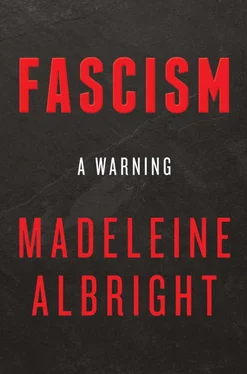From the early stages of his campaign and right into the Oval Office, Donald Trump has spoken harshly about the institutions and principles that make up the foundation of open government. In the process, he has systematically degraded political discourse in the United States, shown an astonishing disregard for facts, libeled his predecessors, threatened to “lock up” political rivals, referred to mainstream journalists as “the enemy of the American people,” spread falsehoods about the integrity of the U.S. electoral process, touted mindlessly nationalistic economic and trade policies, vilified immigrants and the countries from which they come, and nurtured a paranoid bigotry toward the followers of one of the world’s foremost religions.
To officials overseas who have autocratic tendencies, these outbursts are catnip. Instead of challenging anti-democratic forces, Trump is a comfort to them—a provider of excuses. In my travels, I hear the same questions all the time: If the president of the United States says the press always lies, how can Vladimir Putin be faulted for making the same claim? If Trump insists that judges are biased and calls the American criminal system a “laughingstock,” what is to stop an autocratic leader like Duterte of the Philippines from discrediting his own judiciary? If Trump accuses opposition politicians of treason merely for failing to applaud his words, what standing will America have to protest the jailing of prisoners of conscience in other lands? If the leader of the world’s most powerful country views life as a dog-eat-dog struggle in which no country can gain except at another’s cost, who will carry the banner for international teamwork when the most intractable problems cannot be solved in any other way?
National leaders have a duty to serve the best interests of their countries; that is a truism. When Donald Trump talks about “putting America first,” he is stating the obvious. No serious politician has proposed putting America second. The goal is not the issue. What separates Trump from every president since the dismal trio of Harding, Coolidge, and Hoover is his conception of how America’s interests are best advanced. He conceives of the world as a battlefield in which every country is intent on dominating every other; where nations compete like real estate developers to ruin rivals and squeeze every penny of profit out of deals.
Given his life experience, one can see how Trump might think that way, and there are certainly cases in international diplomacy and commerce where a clear separation between winner and loser is evident. However, at least since the end of World War II, the United States has championed the view that victories are more readily won and easier to sustain through cooperative action than by nations acting alone.
The generation of Franklin Roosevelt and Harry Truman argued that states would do best by promoting shared security, prosperity, and freedom. The 1947 Marshall Plan, for example, was grounded in a recognition that the American economy would stagnate without European markets able to buy what U.S. farmers and manufacturers had to sell. This meant that the way to put America first was to help our European (and Asian) partners rebuild and develop dynamic economies of their own. The same thinking led to Truman’s Point Four Program, which made U.S. technical assistance available in Latin America, Africa, and the Middle East. A comparable approach has served us well in the security realm. Presidents from Roosevelt to Obama have sought to help allies protect themselves and to engage in collective defense against common dangers. We did this not in a spirit of charity but because we had learned the hard way that problems abroad, if unaddressed, could, before long, imperil us.
This job of international leadership is not the kind of assignment one ever finishes. Old dangers rarely go away completely, and new ones appear as regularly as dawn. Dealing with them effectively has never been a matter of just money and might. Countries and people must join forces, and that doesn’t happen naturally. Though the United States has made many mistakes in its eventful history, it has retained the ability to mobilize others because of its commitment to lead in the direction most want to go—toward liberty, justice, and peace. The issue before us now is whether America can continue to exhibit that brand of leadership under a president who doesn’t appear to attach much weight to either international cooperation or democratic values.
The answer matters because, although nature abhors a vacuum, Fascism welcomes one.
NOT LONG AGO, WHEN I TOLD A FRIEND I WAS WORKING ON A NEW book, he asked, “What is it about?” “Fascism,” I said. He looked puzzled. “Fashion?” he queried. My friend was less mistaken than it might have seemed, because Fascism has indeed become fashionable, insinuating its way into social and political conversation like a renegade vine. Disagree with someone? Call him a Fascist and thereby relieve yourself of the need to support your argument with facts. In 2016, “Fascism” was searched on the Merriam-Webster dictionary website more often than any other word in English except “surreal,” which experienced a sudden spike after the November presidential election.
To use the term “Fascist” is to reveal oneself. For those on the far left, virtually any corporate bigwig fits the bill. To some on the not-so-far right, Barack Obama is a Fascist—in addition to being a Socialist and a closet Muslim. To a rebellious teen, Fascism may apply to any parentally imposed cell phone restriction. As people vent their daily frustrations, the word escapes a million mouths: teachers are called Fascists, and so, too, are feminists, chauvinists, yoga instructors, police, dieters, bureaucrats, bloggers, bicyclists, copy editors, people who have just quit smoking, and the makers of childproof packaging. If we continue to indulge this reflex, we may soon feel entitled to label as Fascist anyone or anything we find annoying—draining potency from what should be a powerful term.
What, then, is real Fascism, and how does one recognize a practitioner? I put these questions to the graduate class I teach at Georgetown—two dozen students sitting in a circle around my living room balancing lasagna-leaking paper plates on their laps. The queries were harder to answer than might be expected, because there are no fully agreed-upon or satisfactory definitions, though academic writers have spilled oceans of ink in the attempt. It seems that whenever some expert shouts “Eureka!” and claims to have identified a consensus, indignant colleagues disagree.
Despite the complexity, my students were eager to have a go. They began from the ground up, naming the characteristics that were, to their minds, most closely associated with the word. “A mentality of ‘us against them,’” offered one. Another ticked off “nationalist, authoritarian, anti-democratic.” A third emphasized the violent aspect. A fourth wondered why Fascism was almost always considered right-wing, arguing, “Stalin was as much a Fascist as Hitler.”
Still another noted that Fascism is often linked to people who are part of a distinct ethnic or racial group, who are under economic stress, and who feel that they are being denied rewards to which they are entitled. “It’s not so much what people have,” she said, “but what they think they should have—and what they fear.” Fear is why Fascism’s emotional reach can extend to all levels of society. No political movement can flourish without popular support, but Fascism is as dependent on the wealthy and powerful as it is on the man or woman in the street—on those who have much to lose and those who have nothing at all.
This insight made us think that Fascism should perhaps be viewed less as a political ideology than as a means for seizing and holding power. For example, Italy in the 1920s included self-described Fascists of the left (who advocated a dictatorship of the dispossessed), of the right (who argued for an authoritarian corporatist state), and of the center (who sought a return to absolute monarchy). The German National Socialist Party (the Nazis) originally came together around a list of demands that catered to anti-Semites, anti-immigrants, and anti-capitalists but also advocated for higher old-age pensions, more educational opportunities for the poor, an end to child labor, and improved maternal health care. The Nazis were racists and, in their own minds, reformers at the same time.
Читать дальше
Конец ознакомительного отрывка
Купить книгу












